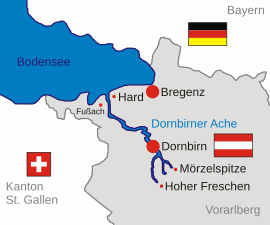Capitulation of Dornbirn facts for kids
Quick facts for kids Capitulation of Dornbirn |
|||||||
|---|---|---|---|---|---|---|---|
| Part of the War of the Third Coalition | |||||||
 Map of the Dornbirn area |
|||||||
|
|||||||
| Belligerents | |||||||
| Commanders and leaders | |||||||
| Units involved | |||||||
| VII Corps | Jellacic's Corps | ||||||
| Strength | |||||||
| 14,000 | 4,058 | ||||||
| Casualties and losses | |||||||
| none | 4,058 7 colours captured |
||||||
The Capitulation of Dornbirn was an important event that happened on November 13, 1805. It was part of the War of the Third Coalition, which was a big conflict during the Napoleonic Wars. In this event, a French army led by Marshal Pierre Augereau faced an Austrian force. The Austrian troops were led by General Franz Jellacic.
The French army had many more soldiers. They surrounded Jellacic's troops near Lake Constance (also called Bodensee). Because they were trapped, General Jellacic and his soldiers had to surrender. Dornbirn is a town in the Austrian area of Vorarlberg. It is about 12 kilometers (7.5 miles) south of Bregenz, at the eastern end of Lake Constance.
What Led to the Capitulation?
In October 1805, a major event called the Ulm Campaign took place. This campaign was a disaster for Austria. Most of their army was surrounded and captured by Napoleon's main French army, called the Grande Armée. Only two groups of Austrian soldiers managed to escape. One group was led by Michael von Kienmayer, and the other by Franz Jellacic.
Kienmayer's soldiers went east towards Vienna, the capital of Austria. But Jellacic's only way to escape was to the south. As some of Napoleon's armies moved south into the Alps mountains, and the main Austrian army moved away from Italy, Jellacic's group became completely cut off. They were separated from the rest of Austria.
Jellacic's Escape Attempt
In an amazing journey, Jellacic's cavalry (soldiers on horseback) tried to reach Bohemia. They managed to get away without being captured. However, Marshal Augereau's French army, known as the VII Corps, arrived late to the main battles. They then moved into the Vorarlberg region.
After several small fights, Augereau's French troops managed to trap Jellacic's infantry (foot soldiers) at Dornbirn. The day before Jellacic surrendered, the French army took control of Vienna, the Austrian capital. However, the war was not over yet. The final big battle, the Battle of Austerlitz, happened on December 2.
The Surrender at Dornbirn
Marshal Augereau's French VII Corps had about 14,000 soldiers. It included two groups of infantry led by Generals Jacques Desjardin and Maurice Mathieu. Jellacic's Austrian force was much smaller. It had about 4,058 soldiers.
When they surrendered, the Austrian force included three generals, 160 officers, and 3,895 regular soldiers. They also lost seven "colors," which are special flags that represent military units. As part of the agreement, the Austrian soldiers had to give up their weapons. They were then allowed to march to Bohemia. They also promised not to fight against France for one year.
 | Valerie Thomas |
 | Frederick McKinley Jones |
 | George Edward Alcorn Jr. |
 | Thomas Mensah |

